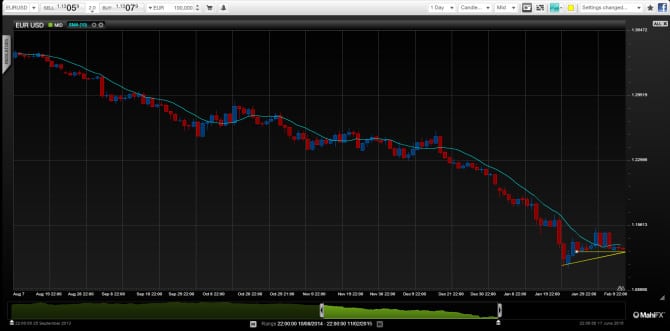Despite the tense negotiations between Greece and it’s Eurozone creditors some sort of solution is likely to be found rather than letting the country leave the EUR and so far that outcome seems relatively well priced into the market.
As is the style with consensus politics some sort of muddled solution is likely to be found between Greece and the Eurozone. Indeed, forex traders have become used to the Eurozone clumsily ambling from one crisis to another. The stand-off with Greece, which wants to ease the austerity programme imposed on it by its creditors, is just the latest instalment of the EUR saga.
A resolution is likely to be temporarily supportive for the EUR – the big danger for EUR longs is if talks break-down with Greece looking dangerously close to exiting the Eurozone.
By Justin Pugsley, Markets Analyst MahiFX Follow @MahiFX on twitter
In this show down, the Eurozone, despite being the creditor, holds the strongest hand. Greece needs to refinance some of its debt (though it runs a primary surplus). Its real Achilles heel is its banks. They’re relying on the European Central Bank – one of Greece’s creditors – for funding.
With capital outflows of EUR15bn since early December, liquidity support from the ECB for Greek banks has risen to EUR56bn at the end of December from EUR44.9bn at the end of November.
If Greece were to leave the Eurozone, it would probably have to re-adopt the Drachma so it could provide liquidity to its banking system (the ECB would cease to do that). At the same time the value of Greek savings would be destroyed and very high interest rates and inflation would follow as the Drachma plunged in value. Also, simply walking away from its EUR denominated debts, 80% held by Eurozone and IMF institutions, may not be that easy either.
EUR/USD – market poised for outcome of Greek negotiations
Fears over moral hazard behind Eurzone’s tough stance
But Greece’s hand isn’t entirely weak The rest of the Eurozone is well aware that should it depart it will damage the EUR’s credibility and raise the prospect of other members being able to leave. That would open up a new front for speculators and make the task of keeping other members in the club harder when they came under attack.
However, putting moral hazard aside for a moment, the right thing to do would be to restructure and even write-off some of Greece’s debt. It currently stands at EUR 320bn – 175% of GDP. The brutal austerity programme has placed the country into a five-year 1930s style depression with 25% unemployment and it has lost a quarter of its GDP.
Lazard Group, which is advising Greece, reckons EUR 100bn of the country’s debt should be written off. From a purely economic perspective they are correct.
Debt restructurings and write-offs are common and do work. If a country follows sensible fiscal and economic policies after the restructuring, the economy recovers, credit ratings improve and it can once again borrow – often at lower rates of interest because the debt burden is more manageable.
But ‘moral high ground’ is likely to prevail on this occasion. The fear being that other bailed out Eurozone countries will also demand debt restructurings and one Irish minister has already said as much about his country deserving the same treatment if Greece benefits from debt forgiveness.
Former US Federal Reserve chairman Alan Greenspan believes that eventual ‘Grexit’ is inevitable. He also thinks the Eurozone itself is likely to break-up unless it becomes a super-state. Public appetite for such a move is steadily diminishing.
In the meantime, the EUR is likely to carry on stumbling from one crisis to another. However, the single currency may yet get some relief if the Eurozone manages to stage an even economic recovery. It would ease many of its internal strains for a while.
In our latest podcast, we do an Aussie Analysis, Greek Grindings and Oil Optimism.

